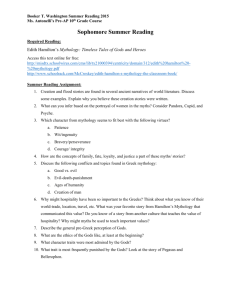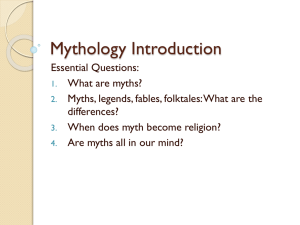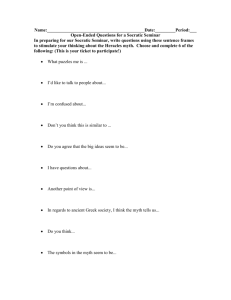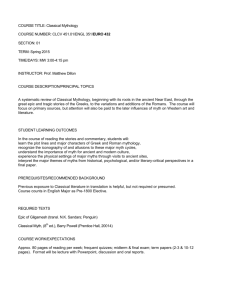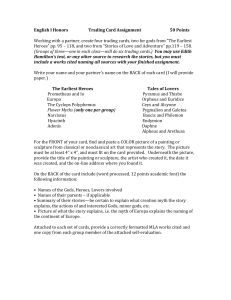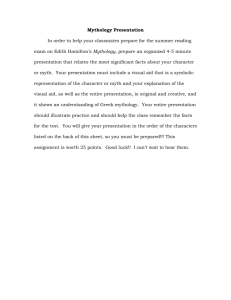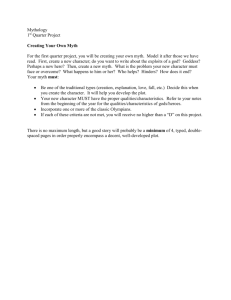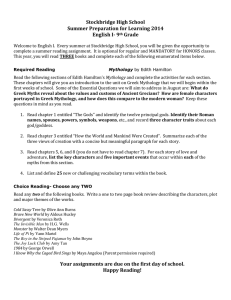MYTH & SYMBOL K Severson Stover Course Description Myth
advertisement
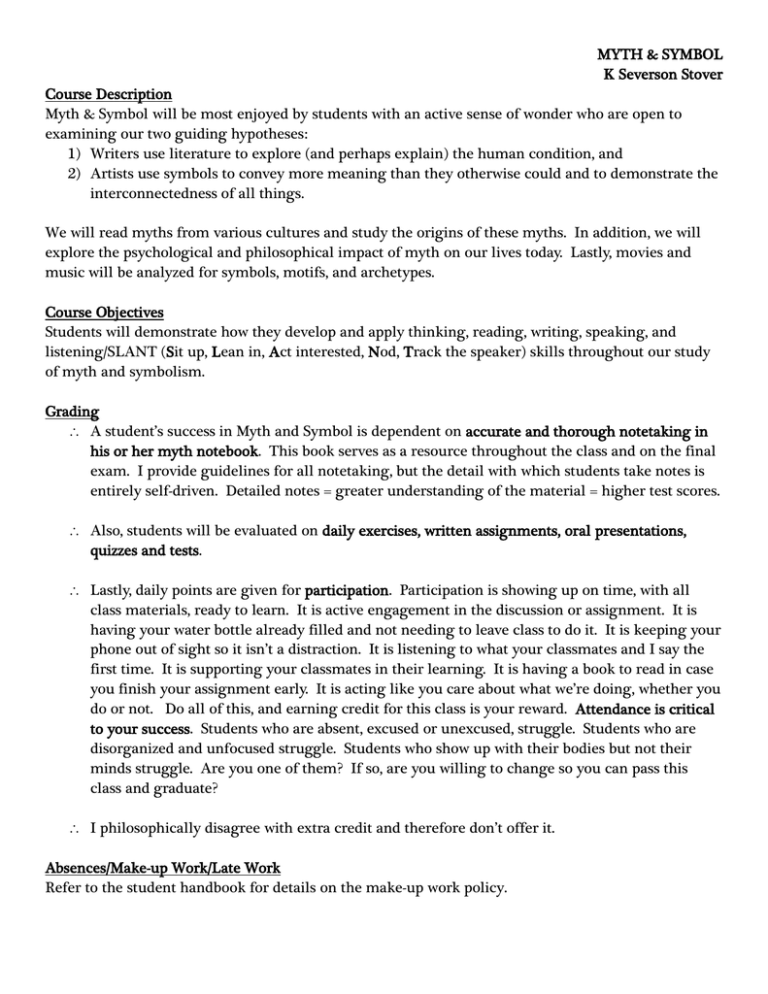
MYTH & SYMBOL K Severson Stover Course Description Myth & Symbol will be most enjoyed by students with an active sense of wonder who are open to examining our two guiding hypotheses: 1) Writers use literature to explore (and perhaps explain) the human condition, and 2) Artists use symbols to convey more meaning than they otherwise could and to demonstrate the interconnectedness of all things. We will read myths from various cultures and study the origins of these myths. In addition, we will explore the psychological and philosophical impact of myth on our lives today. Lastly, movies and music will be analyzed for symbols, motifs, and archetypes. Course Objectives Students will demonstrate how they develop and apply thinking, reading, writing, speaking, and listening/SLANT (Sit up, Lean in, Act interested, Nod, Track the speaker) skills throughout our study of myth and symbolism. Grading A student’s success in Myth and Symbol is dependent on accurate and thorough notetaking in his or her myth notebook. This book serves as a resource throughout the class and on the final exam. I provide guidelines for all notetaking, but the detail with which students take notes is entirely self-driven. Detailed notes = greater understanding of the material = higher test scores. Also, students will be evaluated on daily exercises, written assignments, oral presentations, quizzes and tests. Lastly, daily points are given for participation. Participation is showing up on time, with all class materials, ready to learn. It is active engagement in the discussion or assignment. It is having your water bottle already filled and not needing to leave class to do it. It is keeping your phone out of sight so it isn’t a distraction. It is listening to what your classmates and I say the first time. It is supporting your classmates in their learning. It is having a book to read in case you finish your assignment early. It is acting like you care about what we’re doing, whether you do or not. Do all of this, and earning credit for this class is your reward. Attendance is critical to your success. Students who are absent, excused or unexcused, struggle. Students who are disorganized and unfocused struggle. Students who show up with their bodies but not their minds struggle. Are you one of them? If so, are you willing to change so you can pass this class and graduate? I philosophically disagree with extra credit and therefore don’t offer it. Absences/Make-up Work/Late Work Refer to the student handbook for details on the make-up work policy. If you miss class, please check my homework calendar online. I am available before or after school and during my planning to discuss questions you might have about my homework calendar or to share more detailed information. I am NOT able to go over missed work before or after our class time. It is up to each student to submit made-up work within the appropriate time frame after an absence. As a rule, I do not accept late work. A rare exception to this may be announced when an assignment is given; otherwise, assignments are due by the established deadline. Substitute Teachers Substitute teachers are to be shown every courtesy and cooperation. Class Expectations Students are expected to support the teaching and learning of everyone in the classroom. Suggestions to help with this expectation include the following: Be prompt Be prepared Be kind Be attentive Be respectful Be honest Keep earbuds/headphones and hats in your backpack or car Keep your phone off and out of sight unless asked to use it for an assignment Don’t crowd the door before dismissal Senior Issues Seniors infamously create drama with their grades in required classes. Please realize that: 1) you need to pass a literature class in order to graduate, and 2) if you earn a grade below 40% for the first quarter, you've already failed. It is only a semester long class, and your diploma is on the line. It is a student’s responsibility to take the work seriously. It is not my responsibility to rescue students because they realize - too late - the importance of earning this credit. It is likely I will adore you all, but even that won’t earn you a passing grade. That kind of work is up to you. Academic Honesty Academic honesty is always an expectation; plagiarism (the passing off of someone else's work as one's own, whether it’s an essay from a website or a friend’s worksheet answers) is unethical and therefore unacceptable. CLASS DESIGN Writers use literature to explore and perhaps explain the human condition. Text: Edith Hamilton’s Mythology Part One, chapter I – The Gods The Titans and the Twelve Great Olympians Part One, chapter II – The Two Great Gods of Earth Introduction to Classical Mythology The Mythology of the Greeks The Greek and Roman Writers of Mythology Part One, chapter I – The Gods The Lesser Gods of Olympus The Gods of the Waters The Underworld The Lesser Gods of Earth Part One, chapter III – How the World and Mankind Were Created Part One, chapter IV – The Earliest Heroes Prometheus and Io Europa The Cyclops Polyphemus The Flower Myths – Narcissus, Hyacinth, Adonis Part Two, chapter I – Cupid and Psyche Part Two, chapter II – Eight Brief Tales of Lovers Pyramus and Thisbe Orpheus and Eurydice Ceyx and Alcyone Pygmalion and Galatea Others Part Two, chapter III – The Quest of the Golden Fleece Part Two, chapter IV – Four Great Adventures Phaethon Pegasus and Bellerophon Otus and Ephialtes Daedalus Part Three, chapter I – Perseus Part Three, chapter II – Theseus Part Three, chapter III - Hercules
